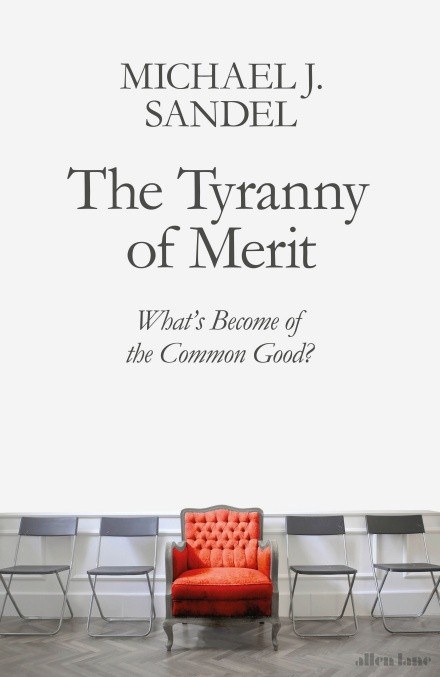
《The Tyranny of Merit》inequality and its impact on society.
1
0

魔法小精灵 2023-05-01 11:33:29
When aspiration for rising is confused with fact, people are invited to blame themselves rather than the systems for "their" failures. The rhetoric of rising not only erodes peoples social esteem but also provides Democrats an excuse to focus on education as the remedy for inequality, while not having to confront no one, and "ignoring what was happening in the real economy—from monopoly power to financialization..." Sandel quoted Frank, "The real problem was one of inadequate worker power, not inadequate worker smarts. The people who produced were losing their ability to demand a share in what they made. The people who owned were taking more and more." Sandels policy recommendation is to use the tax system to discourage speculation and honor productive labor. "A modest step in this direction would be to reduce the payroll tax and make up the lost revenue with a financial transactions tax on high-frequency trading, which contributes little to the real economy."
"Meritocratic sorting taught us that our success is our own doing, and so eroded our sense of indebtedness". But the truth is that credentialism has never been as instrumental as people were led to believe. Diversity, rather than high credentials, is what brings success. One example is that "one of the most successful British governments since the war was its least credentialed and most broadly representative in class terms."
In the end, its important to keep in mind that, as R.H. Tawney pointed out in a book entitled Equality (1931), "individual happiness does not only require that men should be free to rise to new positions of comfort and distinction; it also requires that they should be able to lead a life of dignity and culture, whether they rise or not."
1. Obamas rhetoric is a case in point. In a 2012 radio address, he said, "This is a country where no matter what you look like or where you come from, if youre willing to study and work hard, you can go as far as your talents will take you. You can make it if you try."
This tendency to move from fact to hope and back again is not a slip of the tongue or philosophical confusion but a characteristic feature of political rhetoric. It plays out with special poignance in the rhetoric of rising. Its commingling of hope and fact muddies the meaning of winning and losing. If meritocracy is an aspiration, those who fall short can always blame the system; but if meritocracy is a fact, those who fall short are invited to blame themselves.
2. Thomas Frank, an author with populist sensibilities, criticized liberals focus on education as the remedy for inequality: "To the liberal class, every big economic problem is really an education problem, ‼️ a failure by the losers to learn the right skills and get the credentials everyone knows youll need in the society of the future."...
Frank argued that all the education talk distracted Democrats from thinking clearly about the policies that had led to inequality. Noting that productivity rose during the 1980s and 1990s but that wages did not, he doubted that inequality was due mainly to a failure of education. "The real problem was one of inadequate worker power, not inadequate worker smarts. The people who produced were losing their ability to demand a share in what they made. The people who owned were taking more and more." Failing to see this led Democrats "to ignore what was happening in the real economy—from monopoly power to financialization to labor-management relations—in favor of a moral fantasy that required them to confront no one."
3. But one of the most successful British governments since the war was its least credentialed and most broadly representative in class terms.‼️ In 1945, Clement Attlees Labour Party defeated Winston Churchills Conservatives.
Attlee was an Oxford graduate, but only one in four of his cabinet ministers came from private schools, a lower proportion than in any British cabinets since. Seven of his ministers had worked as coal miners. 57 Attlees highly regarded foreign secretary, Ernest Bevin, who became one of the architects of the postwar world, had left school at the age of eleven and risen through the ranks as a union leader. Herbert Morrison, leader of the House of Commons and deputy prime minister, had left school at fourteen and risen to prominence through local government, helping create Londons public transport system. The health minister, Aneurin Bevan, who had left school at thirteen and worked as a miner in Wales, led the creation of Britains National Health Service. Attlees government, considered "the most significant reforming administration of twentieth century Britain," empowered the working classes and, according to his biographer, "set the ethical terms on which Britains new social contract was founded." 58
4. ...A political agenda that recognizes the dignity of work would use the tax system to reconfigure the economy of esteem by discouraging speculation and honoring productive labor.
Generally speaking, this would mean shifting the tax burden from work to consumption and speculation. A radical way of doing so would be to lower or even eliminate payroll taxes and to raise revenue instead by taxing consumption, wealth, and financial transactions. A modest step in this direction would be to reduce the payroll tax (which makes work expensive for employers and employees alike) and make up the lost revenue with a financial transactions tax on high-frequency trading, which contributes little to the real economy.‼️
5. Meritocratic sorting taught us that our success is our own doing, and so eroded our sense of indebtedness.
6. In a book entitled Equality (1931), R.H. Tawney, a British economic historian and social critic, argued that equality of opportunity is at best a partial ideal. "Opportunities to rise," he wrote, "are not a substitute for a large measure of practical equality, nor do they make immaterial the existence of sharp disparities of income and social condition." 3
Social well-being... depends upon cohesion and solidarity. It implies the existence, not merely of opportunities to ascend, but of a high level of general culture, and a strong sense of common interests.... Individual happiness does not only require that men should be free to rise to new positions of comfort and distinction; it also requires that they should be able to lead a life of dignity and culture, whether they rise or not. 4‼️
相关推荐
萤火谷的梦想家
艾莉森•麦吉出生于1960年,是美国《纽约时报》畅销书作家,同时也是大都会州立大学创意写作课的教授。她的作品被翻译成20多种语言并出版,也曾被提名普利策奖,并获得苏斯博士奖金奖、克里斯托弗图书奖、美国 [美]艾莉森•麦吉/[美]克里斯托弗•丹尼斯/绘 2023-03-27 16:50:25鬼马女神捕1·绝密卧底(上)
腹黑凤凰vs毒舌鸡妖——蓝翎:“小姬,跟我去人界吧!”姬十四:“干吗?让人宰了我做小鸡炖蘑菇吗?”蓝翎:“不啊,让妖怪宰了你做小鸡炖蘑菇更气派。”凤凰蓝翎和鸡妖姬十四生活在无忧无虑的灵界。他们的故乡叫 郝天晓 2023-04-17 00:22:47© 2023-2025 百科书库. All Rights Reserved.












发表评价